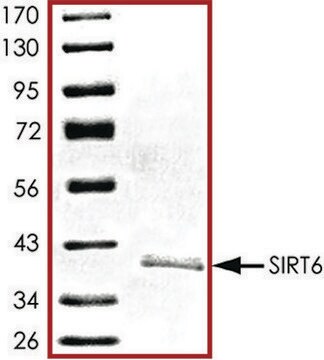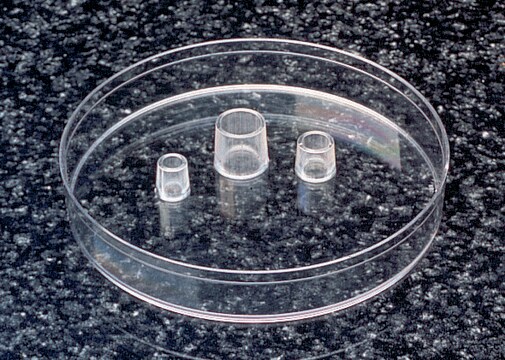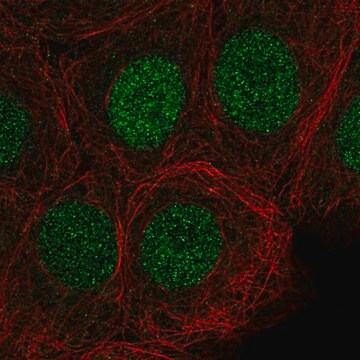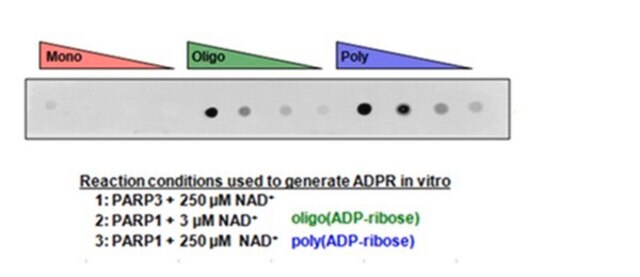SRP0120
Sirtuin 6 human
recombinant, expressed in E. coli, ≥70% (SDS-PAGE)
Synonym(s):
NAD-dependent ADP-ribosyltransferase sirtuin-6, SIR2L6, SIRT6, sir2-like 6
Sign Into View Organizational & Contract Pricing
All Photos(1)
About This Item
UNSPSC Code:
12352200
NACRES:
NA.32
Recommended Products
biological source
human
recombinant
expressed in E. coli
Assay
≥70% (SDS-PAGE)
form
aqueous solution
mol wt
65 kDa
packaging
pkg of 100 μg
storage condition
avoid repeated freeze/thaw cycles
concentration
>0.02 mg/mL
NCBI accession no.
UniProt accession no.
shipped in
dry ice
storage temp.
−70°C
Gene Information
human ... SIRT6(51548)
General description
Sirtuin 6 (Sir6) is encoded by the gene mapped to human chromosome 19p13.3, a region linked with development of acute leukemia. Sir 6 is mainly expressed in bone cells and in the ovaries, but it is absent in the bone marrow. Sirt6 is a chromatin-associated protein localized specifically in nucleus.
Human Sirtuin 6, GenBank Accession No. NM_016539), full length with N-terminal ST tag, MW = 65kDa, expressed in Escherichia coli expression system.
Human Sirtuin 6, GenBank Accession No. NM_016539), full length with N-terminal ST tag, MW = 65kDa, expressed in Escherichia coli expression system.
Application
Useful for the study of enzyme kinetics, screening inhibitors, and selectivity profiling.
Biochem/physiol Actions
Sirtuin 6 (Sir6) is a mono-ADP-ribosyltransferase, which catalyzes the transfer of ADP-ribose moiety from NAD to itself and histones. It has been implicated in the regulation of DNA repair, genomic stability and telomere integrity, gene expression, and metabolism. In addition, it also prevents age-related disorders and premature aging. Sir6 plays a vital role in the inhibition of nuclear factor-κB (NF-κB)–mediated inflammatory responses in rheumatoid joints. Hence, Sir6 is considered to be a potent target for treatment of rheumatoid arthritis (RA). Sir6 is also majorly implicated in the regulation of glucose and fat metabolism. Sir6 prevent cardiac hypertrophy in vitro via inhibiting NF-κB-dependent transcriptional activity and this effect is relied on its deacetylase activity.
Physical form
Formulated in 25 mM Tris-HCl, pH 8.0, 100 mM NaCl, 0.05% Tween-20 and 20% glycerol.
Preparation Note
Thaw on ice. Upon first thaw, briefly spin tube containing enzyme to recover full content of the tube. Aliquot enzyme into single use aliquots. Store remaining undiluted enzyme in aliquots at -70°C. Note: Enzyme is very sensitive to freeze/thaw cycles.
Certificates of Analysis (COA)
Search for Certificates of Analysis (COA) by entering the products Lot/Batch Number. Lot and Batch Numbers can be found on a product’s label following the words ‘Lot’ or ‘Batch’.
Already Own This Product?
Find documentation for the products that you have recently purchased in the Document Library.
Abhishek Bhardwaj et al.
Proceedings of the National Academy of Sciences of the United States of America, 113(5), E538-E547 (2016-01-21)
SIRT6 (sirtuin 6) is a member of sirtuin family of deacetylases involved in diverse processes including genome stability, metabolic homeostasis, and tumorigenesis. However, the role of SIRT6 deacetylase activity in its tumor-suppressor functions is not well understood. Here we report
Neural sirtuin 6 (Sirt6) ablation attenuates somatic growth and causes obesity.
Schwer B
Proceedings of the National Academy of Sciences of the USA, 107(50), 21790-21794 (2010)
Chromosomal organization and fluorescence in situ hybridization of the human Sirtuin 6 gene.
Mahlknecht U
International Journal of Oncology, 28(2), 447-456 (2006)
Minna Rahnasto-Rilla et al.
Chembiochem : a European journal of chemical biology, 17(1), 77-81 (2015-11-27)
Sirtuin 6 (SIRT6) is an NAD+-dependent histone deacetylase enzyme that is involved in multiple molecular pathways related to aging. Initially, it was reported that SIRT6 selectively deacetylated H3K9Ac and H3K56Ac; however, it has more recently been shown to preferentially hydrolyze long-chain
Overexpression of sirtuin 6 suppresses inflammatory responses and bone destruction in mice with collagen-induced arthritis.
Lee HS
Arthritis and Rheumatism, 65(7), 1776-1785 (2013)
Our team of scientists has experience in all areas of research including Life Science, Material Science, Chemical Synthesis, Chromatography, Analytical and many others.
Contact Technical Service






![[Tyr(SO3H)63]-Hirudin Fragment 54-65 ≥95% (HPLC)](/deepweb/assets/sigmaaldrich/product/structures/401/056/a0ac1972-7f9e-45b9-8e32-74f3f275e097/640/a0ac1972-7f9e-45b9-8e32-74f3f275e097.png)
